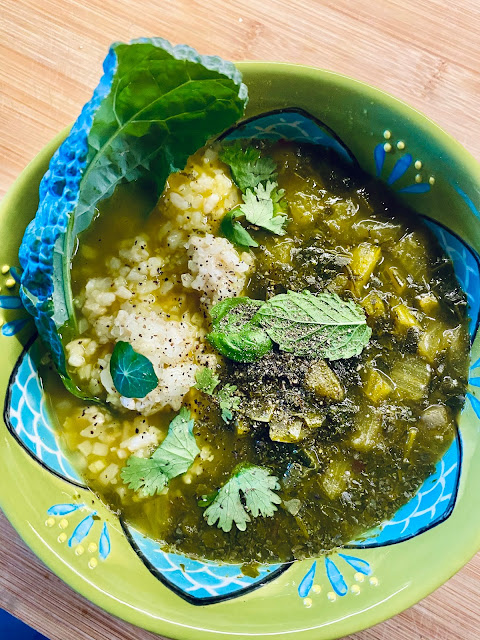Homemade DIY Plant-Based Pet Food
My cat is plant-based, not vegan, just like me. He eats real food, mostly plants.
I rescued cat from my Miami jungle home as he skittishly crawled into my garden kitchen. I spotted him all skinny and scrappy in the yard, and lured him inside with chickpeas because that's all I had at the moment cooking in my kitchen. It looked like he was a nervous little kitty around 9 months old, abandon, near starving, and soiled with dirt from living outdoors. I was surprised he was bold enough to enter, and he decided never to leave. He's been a gift of love and learnings since he arrived in my life.
His name is Cat, a no named nomad. We belong to nobody, and nobody belongs to us. We don't even belong to each other. Yet, we are completely inseparable. He's traveled with me through bike rides, beach hotels, airplanes, and now living his biggest kitty city life up in a Downtown Austin sky rise. The one thing he cares about most besides cuddling is food. In fact, he's completely food obsessed.
Since he came from the Miami streets, I assume he was eating lizards when he could catch them, mice if he was lucky and grass to chew on. Even though I feed him everyday, he's still traumatized from missing meals as a little kitten.
If you've been following my journey, you know I'm health food obsessed. So when I started to read the labels on cat or pet "food", it made me cringe. Even the boujiest pet stores that sell bags of food for $40/bag include preservatives to help keep the food shelf-stable. I don't eat that stuff, neither will cat.
I researched making pet food on-line, and spoke to my vet. Just like human food, there's all sorts of radical articles about why your pet can't be vegan, why you need to purchase commercial pet food in order to keep your pets Ph, carbs, vitamins and mineral levels in check. I even found many extreme articles on how you're even killing your pet by making them eat plant-based. I wonder if that information comes from the same sources who once told us that cow's milk is the strongest source of calcium, or businesses who make us Fat, Sick and Nearly Dead. Got Milk?
I'm no pet doctor so do your own due diligence here. I do understand whole plant-based food alternatives that carry all the essential nutrient rich minerals we need to live as humans. Also, that cats are natural carnivores and require turine and B-12 complex most commonly found in meat, while dogs are omnivors and can live off vegetables and grains. In addition, that cats need a higher protein, low-carb diet in comparison to dogs due to their less physically active lifestyle. With these facts and personal research combine, I have formulated a cautiously balanced plant-based (not vegan) home made, real food alternative that I choose to feed cat.
What I can confirm is that whatever cat is eating today is much healthier than the scraps, rodents and lack of food he would have been eating on the streets. In addition, preservative poisons commercial industries use to keep packaged food shelf-stabilized that animals would never have access to in nature. I also google each ingredient I share with cat to ensure they have the ability to digest it. Through this process, funny enough, I learned cats are also lactose intolerant. So the nostalgic imagery we likely remember of cats licking milk bowls should be out of the picture.
So what's in the fanciest gourmet cat food that I have in my pantry for emergency back up, vs. what's in my homemade cat food?
Theirs: Salmon, salmon meal, peas, pea flour, chickpeas, chicken fat, tocopherols, citric acid, catfish meal, artificial and natural flavors, whitefish meal, flax seeds, chicken meal, alfalfa meal, calcium carbonate, kelp meal, chloine chloride, salt, frutooligosaccharide, tricalcium phosphate, minerals, potassium chloride, taurine, methionine, blueberries, cranberries, vitamins, lactic acid, calcium iodate, sodium selenite, rosemary extract.
Mine: Salmon, chicken or turkey (all naturally hold taurine), peas, pea flour, chicken broth, flax meal, spirulina, kelp, salt, blueberries, sweet potato, rice, celery (which naturally holds minerals, potassium and vitamins), love.
Variety is also key to any well balanced diet, so it's a good idea to switch some weeks cooking with fish, some weeks cooking with chicken, and so on. Since I've been feeding cat this home made food, his coat has never been softer, his weight is just right according to the vet (lean, not too heavy and not too skinny), he has vibrant happy energy and seems to really love the real food I give him. I think this recipe will serve just as well for dogs, so if you have a few animals in your home, they can eat the same meals. I like to make a big pot of this and batch freeze so food is always ready. I freeze pack in 1-weeks worth of containers, and let the containers naturally defrost in fridge the week of serving.
- 4 sweet potatoes, small cubes
- 1 head celery, puréed
- 1 head collard greens, baby spinach, or kale, finely chopped
- 1/4 cup dried rice
- 2 carrots, small cubes
- 1/4 cup blueberries
- 1/4 cup nutritional yeast (b12)
- 2 scoops spirulina
- 1 tsp kosher sea salt
- 1 scoop pure pea powder (or 2 cups puréed peas)
- 4 tbsp flax seed meal (finely ground)
- 2 organic chicken thighs (or meat/poultry of choice, with skin)
- 1 cup chicken liver or chicken hearts (can do a batch with organ meat every other week)
- water, or broth of choice (bone broth, fish broth or chicken broth are good options for additional nutrients too)



















Comments
Post a Comment